Here I am, sitting at my computer in our comfortable apartment in Manhattan, looking at the beautiful skyline and Central Park. Yet just a few days ago, unbelievably, we were in North Korea, a country that comedians might describe as Albania without the glitz. Except that North Korea is no laughing matter.
True, we were very well treated during our 48-hour stay in Pyongyang. Our rooms were well heated, the electricity stayed on, the dinner banquets were sumptuous, and the folk music concert and children's performances were expertly done. Except for the full-time presence of minders, who didn't tolerate straying from the strictly prescribed itinerary or timetable, the hosts were quite gracious. But there were no visits to the countryside, few casual conversations with ordinary citizens, and no invitations to anyone's home.
What we visitors, musicians, and press experienced as Pyongyang is far from representative of the way that typical North Koreans live. It's a totalitarian country, they have a nuclear capability, and they are saber-rattling. The 23 million people have little freedom, many are hungry, energy is in short supply, and almost no one has any knowledge of or contact with the outside world. Yet just 120 miles from Pyongyang lies Seoul, capital of one of the world's most vibrant economies. But as far as North Koreans are concerned, it could be on the moon.
There are three television channels, all with North Korean programming. No cable, no satellite dishes, no CNN (except in a few hotels for foreigners). No Internet access. No free press. Essentially no foreign travel is allowed. And families of citizens defecting to other countries are severely treated, to say the least.
The cult of personality is taken to an unimaginable level. Likenesses of Kim Jong Il, the "Dear Leader," and his late father, Kim Il Sung, the "Great Leader," are everywhere.
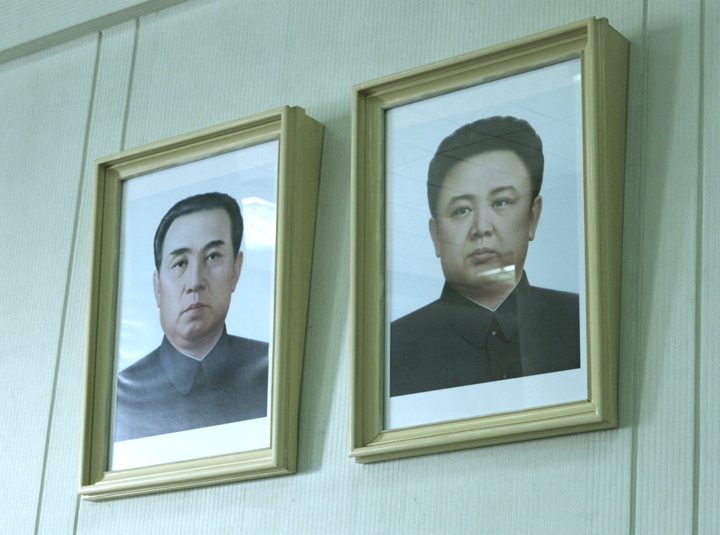
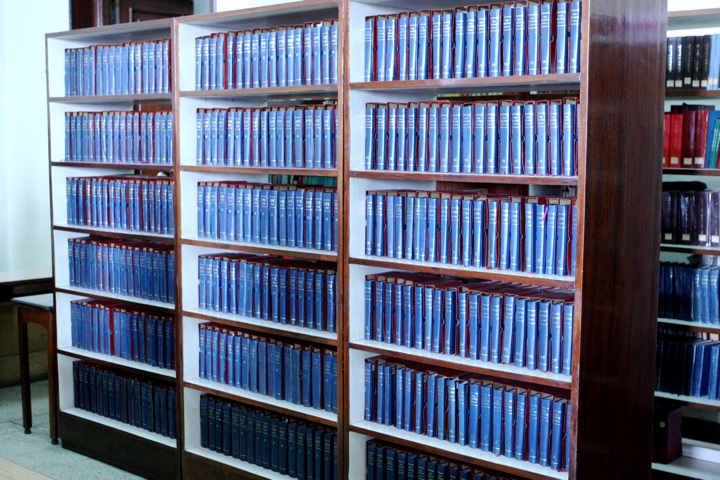
Kim Il Sung and Kim Jong Il and their purported writings
Their writings are regarded as gospel. Newspapers report Kim Jong Il's comings and goings as the most important news of the day, every day.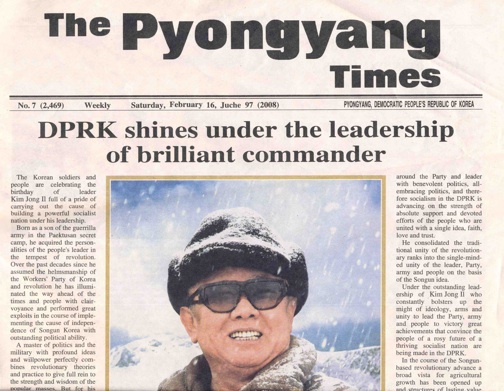
All cultural events end with tributes to the Dear Leader. A professor that our group talked with at the Grand People's Study House was asked to name history's greatest philosophers. His reply: among ancient philosophers, Aristotle; among contemporary philosophers, Kim Jong Il.
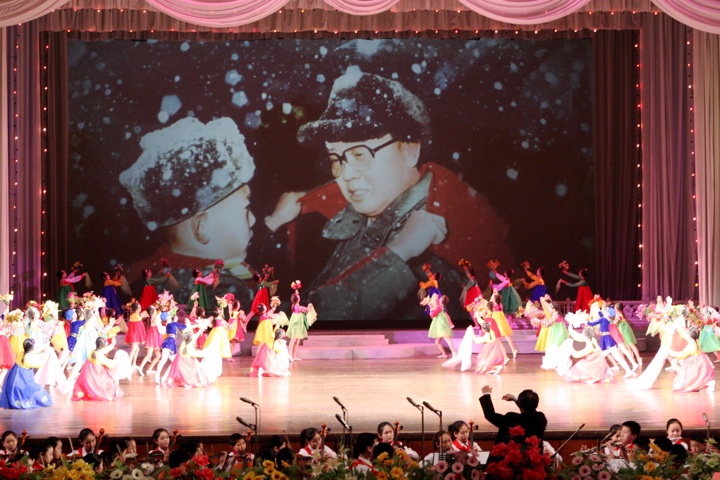
Finale of the children's performance -- guess who's watching
But there are a few glimmers of hope. I don't title my blog "Through Rosen-colored Glasses" for nothing.
First, the very fact that the Philharmonic concert happened at all. Not only did 200 hundred Americans descend on Pyongyang en masse (many more than are typically allowed in the country in a year), but we were accompanied by over 60 members of the world press swelled by a huge contingent of South Korean media. Altogether, we almost overwhelmed our minders (but not quite).
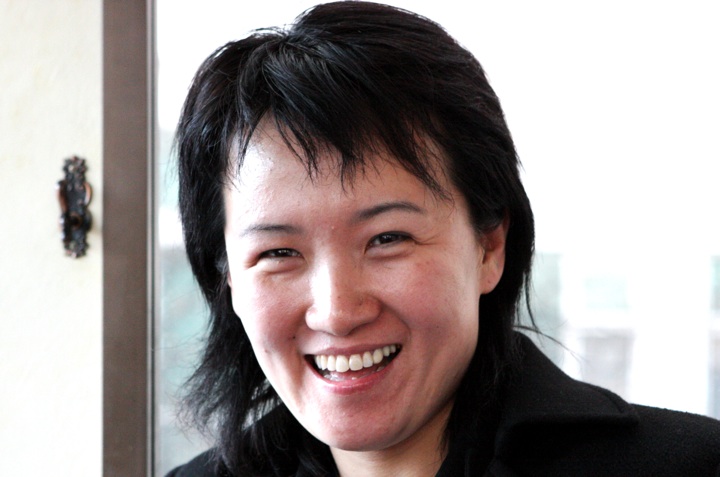
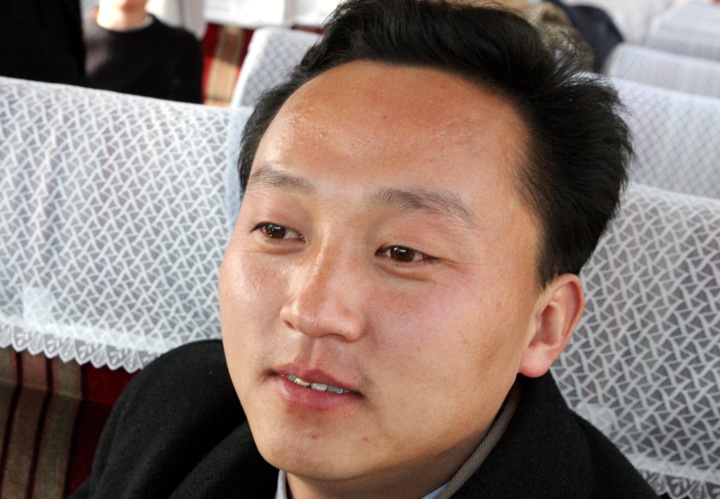
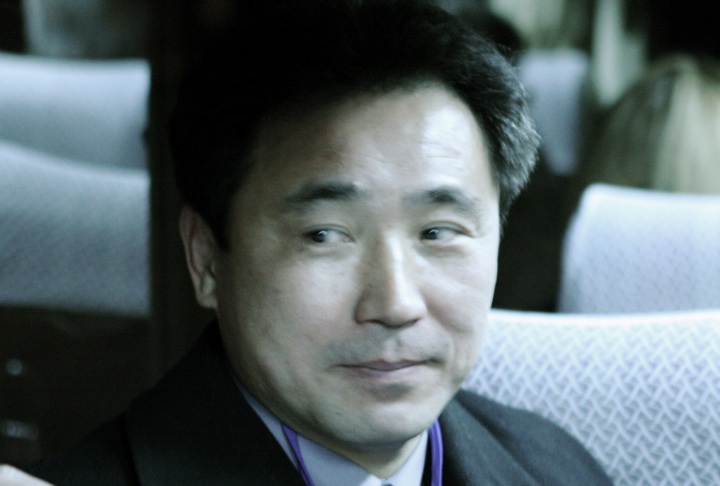
Minders for the New York Philharmonic patrons and board members
Second, most of the North Koreans we met had never seen or talked with an American. And none of us had ever met with a North Korean. At each evening's banquets, there were opportunities to have conversations with our hosts that went beyond just the amenities. And some of the conversations gave us hope. Some talked about aspirations, frustrations, families, and hopes for meeting again in the future.
Third, the reaction to the Philharmonic concert, which has been widely reported worldwide, had to be experienced to be believed. The audience was made up of the favored elite. They were all in their black suits, white shirts, dark ties, and Kim Il Sung lapel pins. They were listening to a type of music that most of them had never heard. Yet as the program progressed from Wagner to Dvorak to Gershwin to Bizet to Bernstein, the enthusiasm of the audience grew palpably. And then, after the concluding Korean folk tune, Arirang, there were prolonged standing ovations, hand-waving, and visible emotion from both the attendees and the orchestra members. It was the only part of our visit that wasn't scripted. It was genuine, it was from the heart, and it represented a start to bridge-building.
Fourth, since last fall, the once ubiquitous anti-American posters have been largely removed from the streets. The War Museum, however, is still devoted almost entirely to the duplicity, iniquity and war-mongering of the United States. The 1968 Pueblo incident and other captured American arms from the Korean War still command major attention.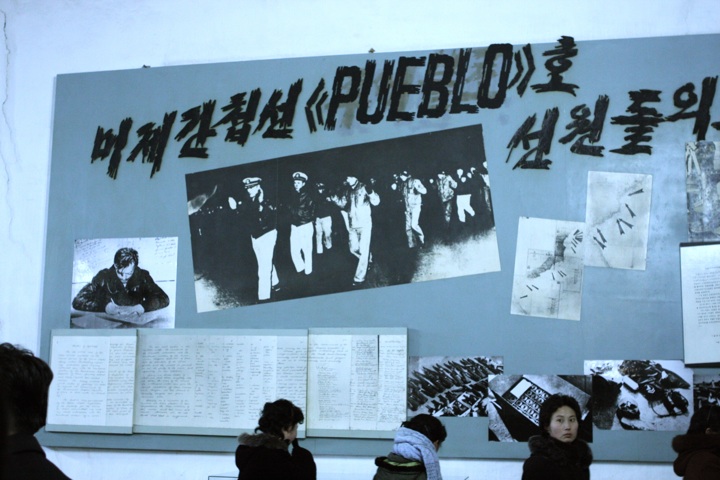
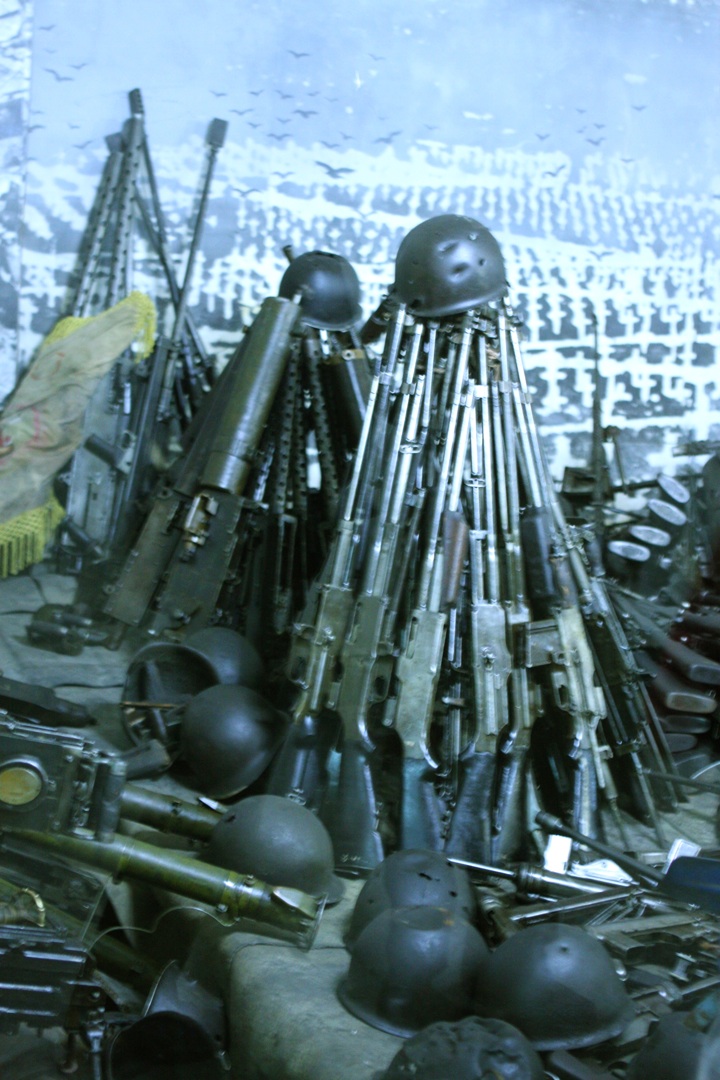
Fifth, eventually there will be regime change. Not necessarily of the Iraq variety, but at some point the 66-year-old Kim Jong Il will move on to that Great Stalinist State in the Sky. The question that no one seems to know is who his successor will be. Little is known in the country about his eldest son, Kim Jong Nam, 37, including where he lives. The military is always a possibility for take over after the Dear Leader goes, and their posture is unpredictable (as is almost everything about North Korea). So we do face a leadership change of uncertain direction and at some point in the future. I know that's not overly helpful, but it may be something to cling to.
Finally, my biggest ray of hope stemming from the trip came about from an unscripted meeting. Shortly before leaving for the airport, I visited a radically conceived new technical university that's in its final construction phase. What makes the Pyongyang University of Science and Technology radical? Well, how about this: textbooks will be in English, instruction will be in English, the faculty will be international, and the university will be connected to the Internet! English books and instruction from foreign professors? Internet connection? In North Korea? In 2008? This development is so important and possibly game-changing that I'm devoting my next posting to it.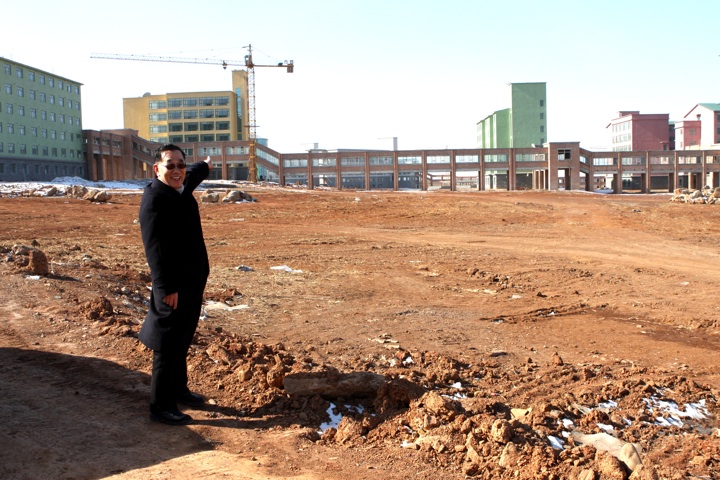
Pyongyang University of Science and Technology site, President and Founder Chin Kyung Kim
Almost everyone in the U.S., including our State Department, felt that the visit was a good idea. But the Wall Street Journal's theater critic, Terry Teachout, has been the most prominent opponent of the holding such a concert in a totalitarian country. He was negative before the event and contemptuous after. In this Saturday's paper, he expanded on his earlier diatribe, and at greater length.
I understand where he's coming from, but I disagreed with him before and I disagree even more now. Diplomacy is not black and white, nor is the world. Somewhere in that vast gray area between the extremes, we have to find ways to build bridges between adversaries and then hope that these bridges will lead to some improvement in relations.
Anthony Tommasini, the chief music critic of the New York Times, who didn't make the trip (though the Times was well represented by other of its journalists), began his review of the broadcast with: "It would have been fascinating to attend the New York Philharmonic's concert at the East Pyongyang Grand Theater in North Korea." Yes, it was fascinating, it was indelible, and our fondest hope is that it was historic -- for the right reasons.
One of the hot speculations on the trip was why neither Condoleezza Rice nor Kim Jong Il attended the Philharmonic concert. As to Condy, she was at the inauguration of South Korea's new president, Lee Myung-bak, in Seoul on Monday. It would have been easy enough to traverse the 120 miles to Pyongyang in plenty of time for the Tuesday evening performance, but the best explanation we heard is that she has to fight Dick Cheney every day over something, and that adding a somewhat controversial and unscheduled visit like this just wasn't worth the effort. As to the Dear Leader's absence, the likely reason is that no one at a high level from the American government was in attendance. And face is important. But imagine if they both were there! Now that would have been interesting. Maybe even more interesting than an American orchestra's playing the North Korean national anthem.
There were no lack of poignant experiences, but there are three that stick out. First, our hotel rooms were not only heated, they were broiling hot. All that fuel to comfort us while much of the country shivers.
Second, all the meals we had were lavish -- too many dishes, too much quantity -- even at breakfast. Huge spreads. It reminded me of a Park Avenue bar mitzvah. (More though the quantity than the quality.) All this in a country where millions have died in famines.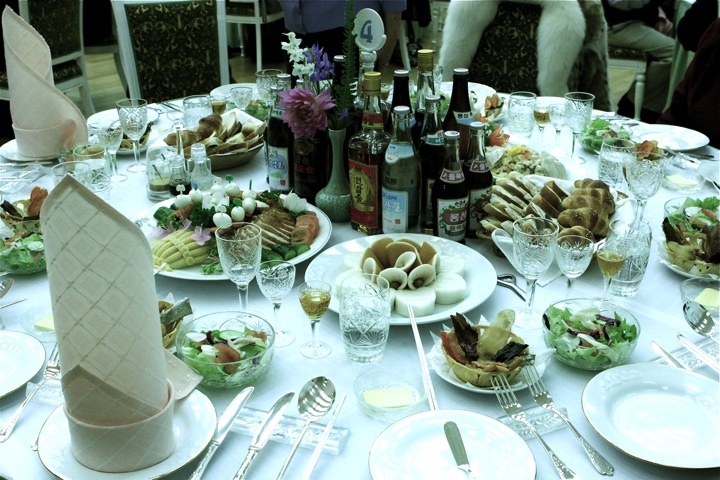
Third, watching the children sing and dance was heart-breaking. Their numbers were perfectly executed, the costumes splendid, and their smiles infectious. But throughout their performances, we just couldn't keep thinking about the depressing futures these kids faced in this ever-so-sad society.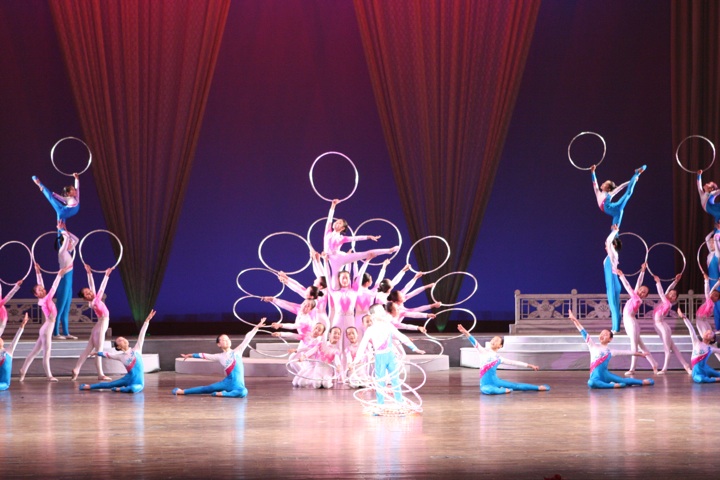
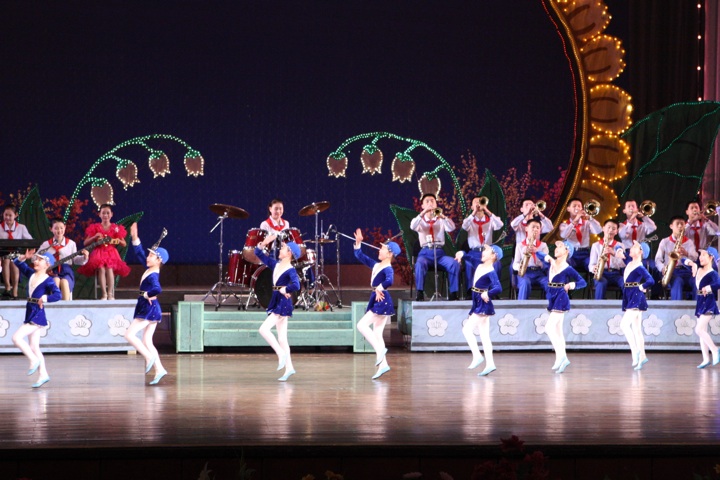
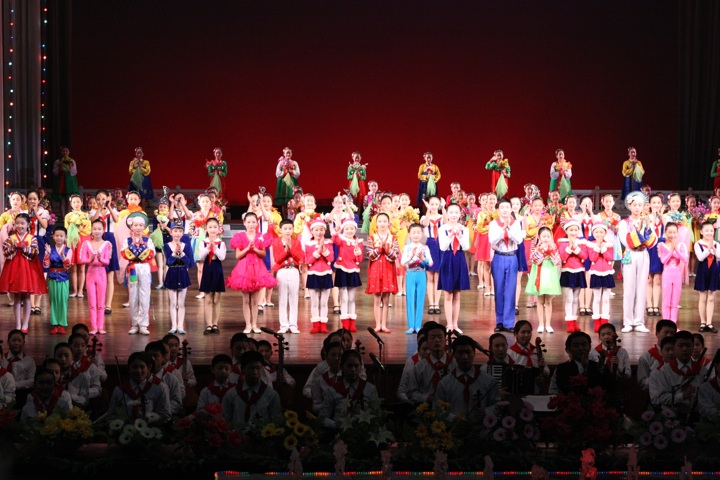
The skyline in Pyongyang was a surprise. I hadn't expected as many high-rises. The most fascinating structure we saw was a pyramidal skyscraper hotel visible from all over Pyongyang. Construction started many years ago but is not finished. And it may never be finished. Our minders were clueless as to providing any information about it, but we did learn that it is structurally unsound and will probably never be occupied. And never taken down. It just sits there, topped off by a crane that they can't seem to remove. As the New Yorker used to headline the occasional oriental blurb: The Mysterious East.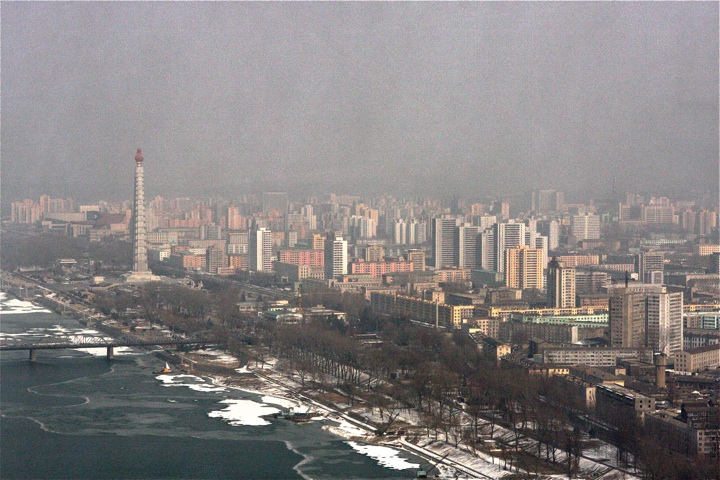
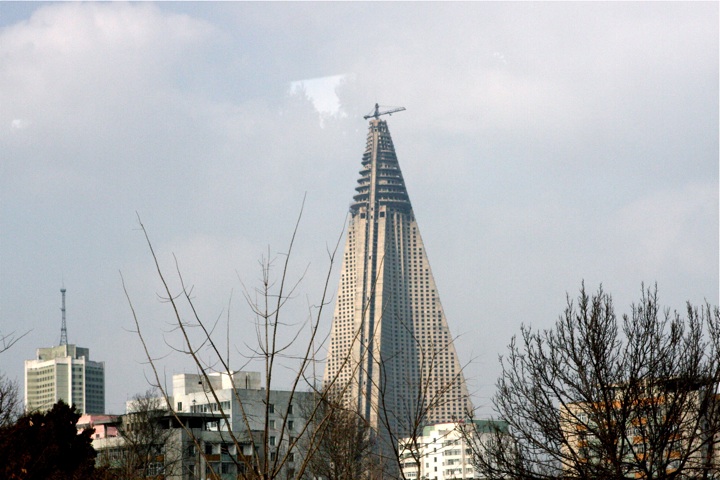
For you movie fans out there, we were astonished to learn that there is a biennial Pyongyang Film Festival. As you might expect, it features films from "non-aligned and other developing countries." As one blogger who attended a few years ago wrote: the festival offers no skin, no stars and no schmoozing. We'll pass.
The biggest mystery to me was, who was The Woman in Red? As we were landing in Pyongyang and taxiing to a stop, I photographed the welcoming delegation. There, standing in the middle of a sea of men garbed uniformly in black was The Woman in Red. Who was she? Why was she in red? And why, after deplaning, was she nowhere to be seen? Another example of The Mysterious East.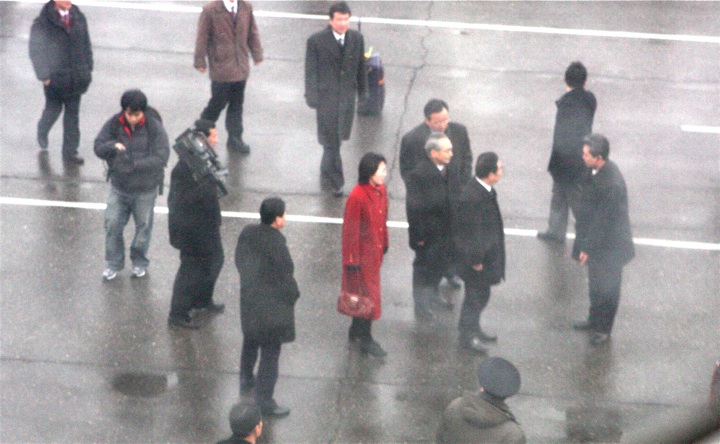
The mysterious Lady in Red
Biggest disappointment to me? One of the most esteemed (and oldest) cultural institutions in New York City made an unprecedented visit to an adversary country, an event with international implications. Whatever history says about the trip, it was certainly one of the major non-Britney press events of the last year. The Philharmonic proudly represented New York City and New York State, and received accolades and adulation. The performance was televised around the world.
But, as a board member of the Philharmonic, I'm chagrined that not a word of support or congratulation or even a "hey, well done, Philharmonic" has yet to come forth from our mayor, our governor, or either senator (well, one of them has been a little preoccupied of late). You know, it's fine to give ticker tape parades to football teams (especially since the winning quarterback went to my high school in New Orleans), but I don't think the Giants' win is going to help make the world any less divided. So how about it, Mr. Mayor, Mr. Governor, Mr./Ms. Senator? If not a ticker tape parade, how about a congratulatory telegram, or maybe just come see us at our next concert? The music ain't bad.
Two final and contrasting images of North Korea I remember:
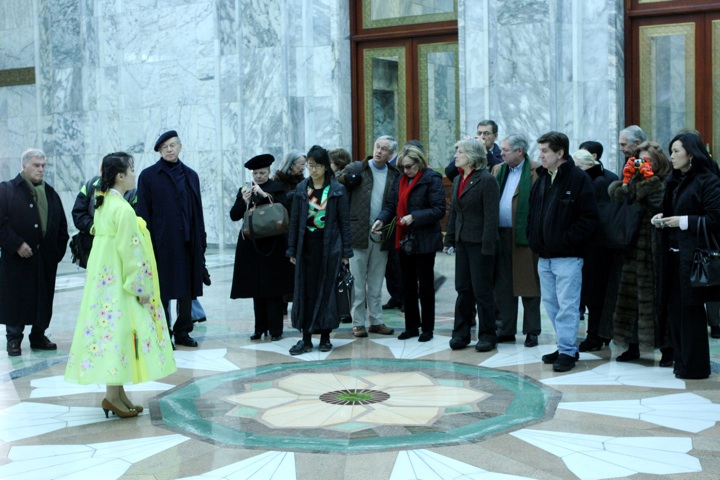
The elegantly dressed guides in schools and museums

It's still a third-world country in many ways